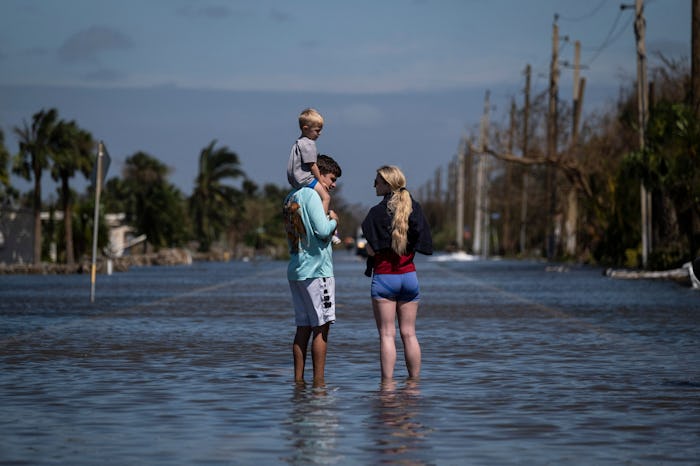News

How To Help Families Impacted By Hurricane Ian
The record-breaking hurricane has caused extensive damage throughout the Sunshine State.
On Wednesday afternoon, Hurricane Ian made landfall in Florida's Lee County, with winds of 150 miles per hour and recording setting storm surge (over 7 feet high) in Fort Meyers. Though it weakened to a tropical storm as it moved inland, the state has suffered tremendous damage to homes, businesses, and vital infrastructure. At least 14 people have been reported dead in counties across the state and that number is expected to rise.
“The impacts of this storm are historic and the damage that was done has been historic,” Gov. Ron DeSantis said in a Thursday press conference. “I think we’ve never seen a flood event like this, we’ve never seen storm surge of this magnitude, and it hit an area where there’s a lot of people in a lot of those low lying areas.”
In the wake of such enormous destruction, many people across the country are asking how they can help victims of the disaster. Here are a few ideas...
#1. Donate to the Red Cross.
In many ways, we know this is an unglamorous answer because it’s so obvious: we all know about the Red Cross. But it’s obvious for a reason. The organization is good in a crisis. Monetary donations to the Red Cross help provide food, shelter, relief supplies, emotional support, recovery planning, and other considerations when and where people need it the most. And since they respond to more than 60,000 disasters each year, they need a lot of consideration. When you make a donation to the Red Cross, you have the option of choosing to aid victims of Ian specifically, general disaster relief, or choose to make a donation where funds are most needed, including Puerto Rico, which is still reeling from the aftermath of Hurricane Fiona.
#2. Check VolunteerFlorida.org for opportunities.
Volunteer Florida is a federally and state supported organization that supports national service, disaster resiliency, and advocates for volunteerism in Florida. In ordinary times, the agency hosts various community service projects. After Hurricane Andrew hit the state in 1992, it became Florida’s lead agency for mobilizing volunteers and coordinating donations before, during and after disasters.
The organization also manages the Florida Disaster Fund, the State of Florida’s official private fund established to assist Florida’s communities respond to and recover from emergencies and disasters. But if you can’t provide a donation you can still check out virtual and in-person volunteer opportunities with other organizations with boots on the ground and a plan in hand.
Check VolunteerFlorida.org for opportunities.
Donate directly to the Florida Disaster Fund.
#3. Support World Central Kitchen.
World Central Kitchen (WCK) was founded in 2010 by renown chef José Andrés after he volunteered to prepare meals for victims of a massive earthquake that devastated Haiti. “Food relief is not just a meal that keeps hunger away. It’s a plate of hope. It tells you in your darkest hour that someone, somewhere, cares about you,” he writes for the organization’s website. WCK doesn’t just bring food to people in need: they hire locals to prepare culturally relevant meals to victims of humanitarian, climate, community, and natural disasters and crises.
“At times like these, it’s easy to feel overwhelmed by the scale of the challenges we face, and the speed of each new crisis,” Andrés writes. “But many complex problems have simple solutions. Sometimes you just need to decide to do something. Sometimes you just have to show up with a sandwich or some warm rice and beans.”
Support World Central Kitchen.
#4. Donate blood at a local drive.
Where there’s a natural disaster there are injured people and where there are injured people there’s almost always a dire need for blood. Donating blood with the Red Cross (yes, them again: we told you, they’re really good in a crisis) is a great way you can help out even if you’re far away or short on extra funds.
While the Red Cross sent blood ahead of the storm to ensure hospitals would be fully stocked, the organization notes on its website that blood is perishable and cannot be stockpiled. “Additionally, platelets are especially vulnerable with only a five-day shelf-life,” they write on their website. “These blood products are routinely in short supply and must constantly be replenished.”
While Type O positive, as a universal donor, is the most coveted blood type, all types are welcome.
To stay up to date on the latest news regarding the ongoing storm, power outages, evacuation orders, missing persons reports, and more, visit the Florida Division of Emergency Management website FloridaDisaster.org, which will connect you to different resources and news sources you can trust.
This article was originally published on